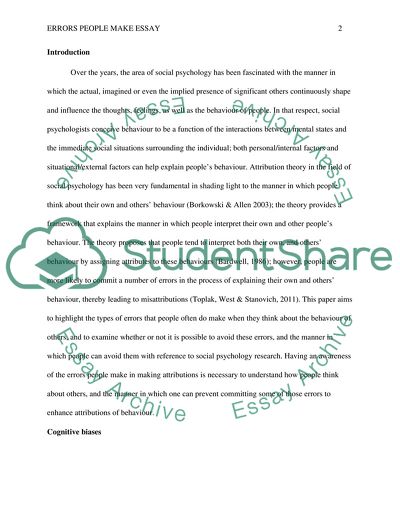Cite this document
(Types of Errors People Make when They Think about the Behaviour of Other People Essay Example | Topics and Well Written Essays - 1750 words, n.d.)
Types of Errors People Make when They Think about the Behaviour of Other People Essay Example | Topics and Well Written Essays - 1750 words. https://studentshare.org/psychology/1808597-what-types-of-errors-do-people-make-when-they-think-about-the-behaviour-of-other-people-can-these-errors-be-avoided-and-how-discuss-with-reference-to-social-psychology-research
Types of Errors People Make when They Think about the Behaviour of Other People Essay Example | Topics and Well Written Essays - 1750 words. https://studentshare.org/psychology/1808597-what-types-of-errors-do-people-make-when-they-think-about-the-behaviour-of-other-people-can-these-errors-be-avoided-and-how-discuss-with-reference-to-social-psychology-research
(Types of Errors People Make When They Think about the Behaviour of Other People Essay Example | Topics and Well Written Essays - 1750 Words)
Types of Errors People Make When They Think about the Behaviour of Other People Essay Example | Topics and Well Written Essays - 1750 Words. https://studentshare.org/psychology/1808597-what-types-of-errors-do-people-make-when-they-think-about-the-behaviour-of-other-people-can-these-errors-be-avoided-and-how-discuss-with-reference-to-social-psychology-research.
Types of Errors People Make When They Think about the Behaviour of Other People Essay Example | Topics and Well Written Essays - 1750 Words. https://studentshare.org/psychology/1808597-what-types-of-errors-do-people-make-when-they-think-about-the-behaviour-of-other-people-can-these-errors-be-avoided-and-how-discuss-with-reference-to-social-psychology-research.
“Types of Errors People Make When They Think about the Behaviour of Other People Essay Example | Topics and Well Written Essays - 1750 Words”. https://studentshare.org/psychology/1808597-what-types-of-errors-do-people-make-when-they-think-about-the-behaviour-of-other-people-can-these-errors-be-avoided-and-how-discuss-with-reference-to-social-psychology-research.


